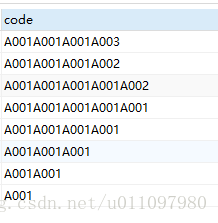基于系统数据过滤权限设计之----lft, rgt的无限分类算法
系统权限设计中的一般常见会有:
用户表
角色表
用户与角色关联表
资源表
角色与资源关联表。
当然这里介绍是笼统的,有些系统中会有用户组表或者角色组表,甚至为了把菜单资源和按钮资源分开,也创建单独的表。这里只介绍一般情况。
而在这里一般情况中,通常会出现用户属于那个组织机构。传统的组织机构以树形结构方式展示,借助组织机构编码进行过滤数据,从而来过滤整个系统的数据。也就是类似这样一种
这样一种组织机构的在进行数据过滤时,通常使用code like '%'方式。这样做什么问题呢?
答:我们知道系统的优化其中最重要的一点就是sql优化,而使用like的方式很不利于优化,影响检索效率;其二如果我们的组织机构很庞大,也就造成了code过长,这个过程会造成在Where表达式的效率。
那么有没有其他好的解决方案呢?
在https://blog.csdn.net/lifetragedy/article/details/7734864 提到穿线树无限分类。我在做这一块时,去寻找网上相关的文档,发现了这样两篇文章:
http://zhanglun1225.iteye.com/blog/602979
https://blog.csdn.net/joph_csu/article/details/54178359
首先这里不做攻击,只做阐述。这两篇文档第一对于快速编码很不方便,篇章一:有些地方叙述过于繁杂,按照其方式书写有问题,需要自行调整。篇章二:使用jFinal框架编写,但是很多项目至今还是任然处于MVC框架模式编写。且两篇文档都没有对等组织机构当前所在等级和等级所在的排序。
于是乎,我建立了这样的表:
DROP TABLE IF EXISTS `sys_organization`;
CREATE TABLE `sys_organization` (
`id` varchar(36) NOT NULL COMMENT '主键id',
`name` varchar(64) NOT NULL COMMENT '组织名',
`address` longtext COMMENT '地址',
`code` varchar(250) NOT NULL COMMENT '编号',
`icon` varchar(32) DEFAULT NULL COMMENT '图标',
`pid` varchar(36) DEFAULT NULL COMMENT '父级主键',
`seq` tinyint(2) NOT NULL DEFAULT '0' COMMENT '排序',
`create_time` datetime NOT NULL COMMENT '创建时间',
`lft` tinyint(2) DEFAULT NULL COMMENT '左范围',
`rgt` tinyint(2) DEFAULT NULL COMMENT '右范围',
`level` tinyint(2) DEFAULT NULL COMMENT '等级',
PRIMARY KEY (`id`)
) ENGINE=InnoDB DEFAULT CHARSET=utf8 COMMENT='组织机构';
SET FOREIGN_KEY_CHECKS=1;借助静态类实现A001这一类编码方式:
package com.huixin.sys.commons.utils;
/**
* 流水号生成规则(按默认规则递增,数字从1-99开始递增,数字到99,递增字母;位数不够增加位数)
* A001
* A001A002
*
*/
public final class OrganizationCodeUtils {
//组织机构起始状态下lft左范围值
public static final int ORGANIZATION_LFT=2;
// 数字位数(默认生成3位的数字)
private static final int numLength = 3;//代表数字位数
public static final int zhanweiLength = 1+numLength;
public static final String ZIMUA="A";
/**
* 根据前一个code,获取同级下一个code
* 例如:当前最大code为D01A04,下一个code为:D01A05
*
* @param code
* @return
*/
public static synchronized String getNextOrganizationCode(String code) {
String newcode = "";
if (code == null || code =="") {
String zimu = ZIMUA;
String num = getStrNum(1);
newcode = zimu + num;
} else {
String before_code = code.substring(0, code.length() - 1- numLength);
String after_code = code.substring(code.length() - 1 - numLength,code.length());
char after_code_zimu = after_code.substring(0, 1).charAt(0);
Integer after_code_num = Integer.parseInt(after_code.substring(1));
System.out.println(after_code);
System.out.println(after_code_zimu);
System.out.println(after_code_num);
String nextNum = "";
char nextZimu = 'A';
// 先判断数字等于999*,则计数从1重新开始,递增
if (after_code_num == getMaxNumByLength(numLength)) {
nextNum = getNextStrNum(0);
} else {
nextNum = getNextStrNum(after_code_num);
}
// 先判断数字等于999*,则字母从A重新开始,递增
if(after_code_num == getMaxNumByLength(numLength)) {
nextZimu = getNextZiMu(after_code_zimu);
}else{
nextZimu = after_code_zimu;
}
// 例如Z99,下一个code就是Z99A01
if ('Z' == after_code_zimu && getMaxNumByLength(numLength) == after_code_num) {
newcode = code + (nextZimu + nextNum);
} else {
newcode = before_code + (nextZimu + nextNum);
}
}
return newcode;
}
/**
* 根据父亲code,获取下级的下一个code
*
* 例如:父亲CODE:A01
* 当前CODE:A01B03
* 获取的code:A01B04
*
* @param parentCode 上级code
* @param localCode 同级code
* @return
*/
public static synchronized String getSubOrganizationCode(String parentCode,String localCode) {
if(localCode!=null && localCode!=""){
// return parentCode + getNextOrganizationCode(localCode);
return getNextOrganizationCode(localCode);
}else{
parentCode = parentCode + ZIMUA+ getNextStrNum(0);
}
return parentCode;
}
/**
* 将数字前面位数补零
*
* @param num
* @return
*/
private static String getNextStrNum(int num) {
return getStrNum(getNextNum(num));
}
/**
* 将数字前面位数补零
*
* @param num
* @return
*/
private static String getStrNum(int num) {
String s = String.format("%0" + numLength + "d", num);
return s;
}
/**
* 递增获取下个数字
*
* @param num
* @return
*/
private static int getNextNum(int num) {
num++;
return num;
}
/**
* 递增获取下个字母
*
* @param num
* @return
*/
private static char getNextZiMu(char zimu) {
if (zimu == 'Z') {
return 'A';
}
zimu++;
return zimu;
}
/**
* 根据数字位数获取最大值
* @param length
* @return
*/
private static int getMaxNumByLength(int length){
if(length==0){
return 0;
}
String max_num = "";
for (int i=0;i废话不说,上代码,造轮子:
@Override
public Integer saveOrganization(SysOrganization organization){
if(StringUtils.isBlank(organization.getPid())){ //pid为空
organization.setPid(null);
String localMaxCode = getMaxOrganizationCode(null);
organization.setCode(OrganizationCodeUtils.getNextOrganizationCode(localMaxCode));
Integer seq=organizationMapper.getMaxSeqOrganization(null);
if(seq==null){
organization.setSeq(1);
}else{
organization.setSeq(seq+1);
}
Integer lft=organizationMapper.getMaxLftOrganization(null);
if(lft==null){
organization.setLft(OrganizationCodeUtils.ORGANIZATION_LFT);
organization.setRgt(OrganizationCodeUtils.ORGANIZATION_LFT+1);
}else{
organization.setLft(lft+1);
organization.setRgt(lft+2);
}
}else{ //pid不为空
SysOrganization organizationParent=organizationMapper.selectById(organization.getPid());
String localMaxCode = getMaxOrganizationCode(organizationParent.getCode());
organization.setCode(OrganizationCodeUtils.getSubOrganizationCode(organizationParent.getCode(), localMaxCode));
//还需要处理seq和level
handleSeq(organization);
//新增节点
//1.查找当前插入节点的父节点的lft值
Integer lft=organizationParent.getLft();
//2.将树形中所有lft和rgt节点大于父节点左值的节点都+2
organizationMapper.updateAllLft(2, lft);
organizationMapper.updateAllRgt(2, lft);
//3.将父节点左值+1,左值+2分别作为当前节点的lft和rgt
organization.setLft(lft+1);
organization.setRgt(lft+2);
}
organization.setLevel(organization.getCode().length()/OrganizationCodeUtils.zhanweiLength-1);
organization.setCreateTime(new Date());
return organizationMapper.insert(organization);
}
@Override
public Integer updateOrganization(SysOrganization organization){
if(StringUtils.isNotBlank(organization.getPid())){
SysOrganization organizationParent=organizationMapper.selectById(organization.getPid());
String localMaxCode = getMaxOrganizationCode(organizationParent.getCode());
organization.setCode(OrganizationCodeUtils.getSubOrganizationCode(organizationParent.getCode(), localMaxCode));
//还需要处理seq和level
handleSeq(organization);
//在修改lft和rgt之前,当前节点的父节点id已经改变
//1.查出当前节点的左右节点(nodelft、nodergt),并nodergt-nodelft+1 = span,获取父节点的左节点parentlft
Integer nodelft=organization.getLft();
Integer nodergt=organization.getRgt();
Integer span=nodergt-nodelft+1;
Integer parentlft=organizationParent.getLft();
//2.将所有大于parentlft的lft(左节点)、rgt(右节点)的值+span
organizationMapper.updateAllLft(span, parentlft);
organizationMapper.updateAllRgt(span, parentlft);
//3.查找当前节点的左右节点(nodelft、nodergt),并parentlft-nodelft+1 = offset
SysOrganization currentOrganization=organizationMapper.selectById(organization.getId());
nodelft=currentOrganization.getLft();
nodergt=currentOrganization.getRgt();
Integer offset = parentlft - nodelft + 1;
//4.将所有lft(左节点) between nodelft and nodergt的值+offset
organizationMapper.updateLftRgtWhereLftBetweenAnd(offset, nodelft, nodergt);
//5.将所有大于nodergt的lft(左节点)、rgt(右节点)的值-span
organizationMapper.updateAllLftSubtraction(span, nodergt);
organizationMapper.updateAllRgtSubtraction(span, nodergt);
//新的lft rgt
SysOrganization organizationParentChanaged=organizationMapper.selectById(organization.getOrgPid());
organization.setLft(organizationParentChanaged.getLft()+1);
organization.setRgt(organizationParentChanaged.getLft()+span);
}else{
organization.setPid(null);
}
organization.setLevel(organization.getCode().length()/OrganizationCodeUtils.zhanweiLength-1);
organization.setCreateTime(new Date());
return organizationMapper.updateById(organization);
}
public Integer deleteOrganization(String id){
Integer row=organizationMapper.selectCurrentNodeIsExistParent(id);
if(row==0){
//删除节点
//1. 查找要删除节点的lft值
SysOrganization organization=organizationMapper.selectById(id);
Integer lft=organization.getLft();
//2.将所有lft和rgt大于删除节点lft值的都-2
organizationMapper.updateAllLftSubtraction(2, lft);
organizationMapper.updateAllRgtSubtraction(2, lft);
return organizationMapper.deleteById(id);
}else{
return -1;
}
}
/**
* 得到最大的组织机构code
* @param parentCodeLength
* @param parentCode
* @return
*/
protected String getMaxOrganizationCode(String parentCode){
if(StringUtils.isBlank(parentCode)){
parentCode = "";
}
int localCodeLength = parentCode.length() + OrganizationCodeUtils.zhanweiLength;
List listStr=organizationMapper.getMaxOrganizationCode(localCodeLength, OrganizationCodeUtils.ZIMUA, parentCode);
if(listStr!=null && listStr.size()>0){
return listStr.get(0);
}else{
return null;
}
}
/**
* 处理level等级和seq
* @param organization
*/
protected void handleSeq(SysOrganization organization){
Integer seq=organizationMapper.getMaxSeqOrganization(organization.getPid());
if(seq!=null){
seq=seq+1;
}else{
seq=1;
}
organization.setSeq(seq);
} 而在Mapper中:我这里使用注解和XML的混合方式编码
/**
* 通过pid得到最大的seq
* @param Pid
* @return
*/
Integer getMaxSeqOrganization(@Param("Pid")String Pid);
/**
* 通过pid得到最大的lft
* @param Pid
* @return
*/
Integer getMaxLftOrganization(@Param("Pid")String Pid);
/**
* 更新所有的左范围值
* @param span
* @param lft
* @return
*/
Integer updateAllLft(@Param("span")Integer span, @Param("lft")Integer lft);
/**
* 更新所有的右范围值
* @param span
* @param rgt
* @return
*/
Integer updateAllRgt(@Param("span")Integer span, @Param("rgt")Integer rgt);
/**
* 将所有lft(左节点) between nodelft and nodergt的值+offset
* @param offset
* @param nodeLft
* @param nodeRgt
* @return
*/
@Update("UPDATE sys_organization SET lft = lft + #{offset},rgt = rgt + #{offset} WHERE lft BETWEEN #{nodeLft} AND #{nodeRgt}")
Integer updateLftRgtWhereLftBetweenAnd(@Param("offset")Integer offset, @Param("nodeLft")Integer nodeLft, @Param("nodeRgt")Integer nodeRgt);
/**
* 将所有大于nodergt的lft(左节点)、rgt(右节点)的值-span[清除位置]
* @param span
* @param nodergt
* @return
*/
@Update("UPDATE sys_organization SET lft = lft - #{span} WHERE lft > #{nodergt}")
Integer updateAllLftSubtraction(@Param("span")Integer span, @Param("nodergt")Integer nodergt);
/**
* 将所有大于nodergt的lft(左节点)、rgt(右节点)的值-span[清除位置]
* @param span
* @param nodergt
* @return
*/
@Update("UPDATE sys_organization SET rgt = rgt - #{span} WHERE rgt > #{nodergt}")
Integer updateAllRgtSubtraction(@Param("span")Integer span, @Param("nodergt")Integer nodergt);
/**
* 当前节点下是否有子节点
* @param id
* @return
*/
@Select("SELECT COUNT(*) FROM sys_organization WHERE pid = #{id}")
Integer selectCurrentNodeIsExistParent(@Param("id")String id);xml中:
UPDATE sys_organization
lft = #{lft}
rgt = #{rgt}
UPDATE sys_organization
SET lft = lft + #{span}
lft > #{lft}
UPDATE sys_organization
SET rgt = rgt + #{span}
rgt > #{rgt}
